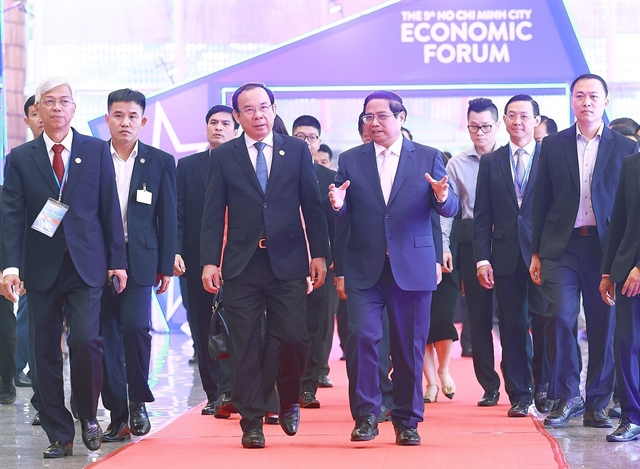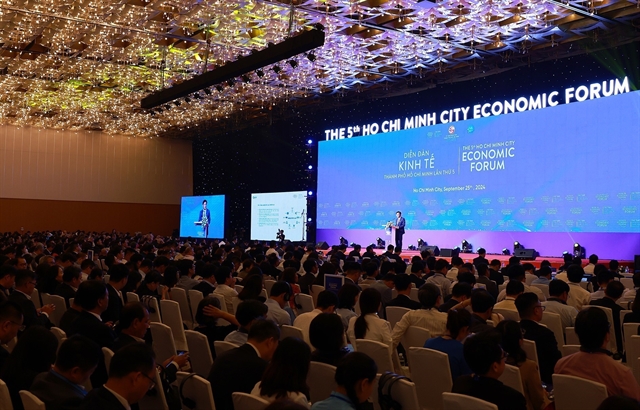 Economy
Economy

 |
| Prime Minister Phạm Minh Chính attends the 5th HCM City Economic Forum on September 25. — VNA/VNS Photo |
HCM CITY — HCM City needs to focus on transforming its industries towards digitalisation and sustainability, experts told the 5th HCM City Economic Forum that opened on Wednesday.
With the theme “Industrial Transformation - a New Driving Force for HCM City’s Sustainable Development,” the forum discussed topics such as global industrial transformation trends, the direction for HCM City’s industrial transformation and policies required.
Prime Minister Phạm Minh Chính, HCM City Party Secretary Nguyễn Văn Nên, economic experts in Việt Nam and 16 different countries attended the event.
Speaking at the opening, Nên said the city is set to become a modern industrial city, and by 2045 its industry is to be on a par with that of other major cities in the region as mandated by the Politburo’s Resolution 31 on the directions for its development.
It has identified sustainable transformation, industrial transformation, and digital transformation as keys to reaching those goals, he said.
It needs to quickly improve its socio-economic infrastructure, especially traffic, technology and the environment, upgrade its workforce, focus on administrative reform, and come up with disruptive polices to mobilise investment, resolve difficulties, and create a favourable environment for businesses, he said.
Phạm Bình An, deputy director of the HCM City Institute for Development Studies, said the trend of sustainable development is becoming more and more widespread around the world, with the focus being on reducing gas emissions to deal with climate change.
Businesses risk losing their market if they do not transform themselves to achieve sustainability, he warned.
HCM City is a major hub for economy, culture, education, science and technology, and contributes 15.9 per cent of the country’s GDP, but the past few years has not been achieving its potential, he said.
HCM City’s economic contribution has been falling as has its share of export and industrial production, he said.
Its economy has stagnated in terms of efficiency, and its driving forces for development are dwindling, he said.
Its industrial areas only accounts for 2.81 per cent of the country’s, and land there is becoming more and more expensive, he said.
It needs to restructure its economy by focusing more on digitalisation, sustainability, improving value chains, and developing core industries, which would help find new driving forces for development, he added.
 |
| The 5th HCM City Economic Forum focuses on industrial transformation, digital transformation and sustainability. — VNA/VNS Photo |
Kiva Allgood, director of the Centre for Advanced Manufacturing and Supply Chain and executive director of the World Economic Forum, said industrial transformation trends are affected by new technologies, and artificial intelligence is the new key to industry.
She said one of the most difficult trends to predict is changes in geo-politics, and it requires countries and businesses to always have back-up plans to maintain supply chains.
A country’s level of readiness to adapt determines whether it can grasp opportunities amid the waves of shifting production and investment.
Rich McClellan, country director, Việt Nam, of the Tony Blair Institute, said HCM City should prioritise several strategic sectors: electronics and hi-tech manufacturing, which could make use of its industrial infrastructure and skilled labour, and digital economy and information technology, which could utilise its growing technology eco-system and young, tech-savvy workers.
There are also renewable energy and green technology, which provides HCM City a chance to be a leader in terms of green economy development; and the last sector is green finance, which is needed to provide capital for sustainable development.
To foster their development, it is important to improve infrastructure, administrative procedures and workforce quality.
Phạm Hồng Điệp, chairman of Shinec JSC, the developer of the Nam Cầu Kiền Industrial Park in Hải Phòng City, said transforming HCM City’s existing industrial parks to eco-industrial parks is vital.
Other experts also agreed that investment in the workforce is crucial for industrial transformation.
A dialogue session was held on the same day with the Prime Minister, Government officials and businesses discussing development policies.
During the session, Prime Minister Phạm Minh Chính said that industrialisation and urbanisation must take into account Việt Nam's condition as well as global trends, adding that the Government needs to build and perfect its institutions.
Recently, the Government has reported amendments to several laws to the National Assembly (NA). These include the Law on Electronic Transactions, the Law on Land, the Law on Housing and the Law on Real Estate Business. The Government is also currently developing many other laws, such as the Law on Data.
According to the prime minister, the Government must also build mechanisms and policies to mobilise resources and promote infrastructure development, especially digital infrastructure, traffic infrastructure and infrastructure to help tackle climate change.
Clear plans for workforce training are also needed.
With transformation -- particularly digital and green transformation -- a top priority, the Government has to mobilise assistance from friends and international partners.
“The Communist Party of Việt Nam affirms that we will not sacrifice the environment to chase simple economic growth. One of the solutions to protecting the environment is developing the circular economy, which cuts down on resource-intensiveness and utilises other materials, such as using waste to produce electricity," said the PM.
"The way of the Party is clear, and regulations are falling into place. Việt Nam in general and the Government specifically are focusing on raising awareness and building mechanisms and policies to mobilise private funding. Every person has a role in pursuing the circular economy."
On Tuesday, the HCM City Friendship Dialogue was held with officials from around the world sharing their experiences in industrial transformation, the importance of hi-tech parks in attracting investment and attracting skilled workers. VNS




